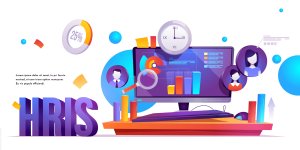In today’s fast-paced business world, the role of Human Resources has evolved beyond recruitment and payroll. It’s now a strategic partner in growth, culture, and performance. At the heart of this transformation is a powerful tool: HRIS – Human Resource Information System.
Think of HRIS as the digital brain of HR operations—streamlining tasks, boosting efficiency, and enabling data-driven decisions.
Whether it’s tracking attendance, managing benefits, or analyzing workforce trends—HRIS automates and integrates it all. This frees up HR teams to focus less on paperwork and more on people.
From a business perspective, this means:
It empowers employees to manage their own profiles, request time off, update documents, and even access training modules—all without emailing HR repeatedly. This not only boosts satisfaction but also fosters transparency and trust within the organization.
There are many HRIS platforms on the market—some tailored for small businesses, others built for large enterprises. The key is identifying your organization’s specific needs.
Do you need payroll integration? Learning and development modules? Advanced analytics? Choose a system that scales with your growth and adapts to your HR goals. Also, consider the learning curve. An HRIS should make work easier, not more complicated. A clean interface, solid support system, and customizability go a long way.
Think of HRIS as the digital brain of HR operations—streamlining tasks, boosting efficiency, and enabling data-driven decisions.
Moving Beyond Spreadsheets
Gone are the days when HR professionals juggled bulky files, manual records, and Excel sheets. HRIS has replaced that clutter with a centralized, cloud-based system that handles everything from employee onboarding to exit interviews.Whether it’s tracking attendance, managing benefits, or analyzing workforce trends—HRIS automates and integrates it all. This frees up HR teams to focus less on paperwork and more on people.
Why HRIS Matters to Every Organization
Regardless of size or industry, every business deals with people, and people mean data. HRIS collects, stores, and processes that data efficiently and securely.From a business perspective, this means:
- Improved decision-making with real-time analytics
- Reduced errors and redundancies in HR processes
- Stronger compliance with labor laws and reporting standards
- Enhanced employee experience through self-service portals
HRIS and the Employee Experience
Modern employees expect a seamless, tech-driven experience—from applying for leave to viewing payslips. HRIS delivers that through user-friendly dashboards, mobile access, and personalized features.It empowers employees to manage their own profiles, request time off, update documents, and even access training modules—all without emailing HR repeatedly. This not only boosts satisfaction but also fosters transparency and trust within the organization.
Choosing the Right HRIS: One Size Doesn’t Fit All
There are many HRIS platforms on the market—some tailored for small businesses, others built for large enterprises. The key is identifying your organization’s specific needs.
Do you need payroll integration? Learning and development modules? Advanced analytics? Choose a system that scales with your growth and adapts to your HR goals. Also, consider the learning curve. An HRIS should make work easier, not more complicated. A clean interface, solid support system, and customizability go a long way.

